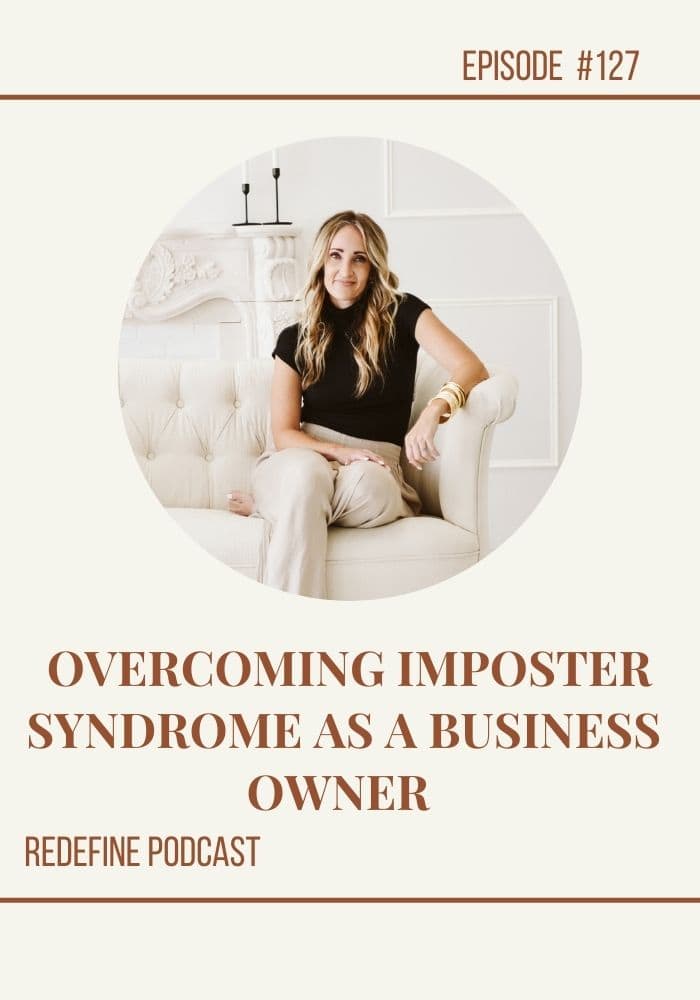
OVERCOMING IMPOSTER SYNDROME AS A BUSINESS OWNER
Imposter syndrome is a psychological phenomenon where individuals doubt themselves and have a fear of being exposed as a “fraud.” Despite all the evidence that you are capable, when you’re experiencing imposter syndrome, you’re convinced that nobody will take you seriously as a professional. For business owners, this can really take a hold of their progress, impacting decision-making, marketing, and the overall growth of their business.
Understanding Imposter Syndrome in Business
The term “imposter syndrome” was first coined in 1978 by psychologists Pauline Clance and Suzanne Imes. They found that many high-achieving women often believed they were not as intelligent as others perceived them to be. Over time, research has shown that this syndrome affects a diverse group of people, including men and individuals from various fields, particularly business owners who carry the weight of their company’s success on their shoulders.
Common characteristics of imposter syndrome include:
Self-Doubt: Persistent feelings of inadequacy.
Attributing Success to External Factors: Believing that success is due to luck or external factors rather than one’s own skills or qualifications.
Fear of Exposure: A constant fear that one’s true lack of ability will be discovered.
Overachieving: Working excessively hard to avoid being “found out.”
Not Accepting Praise: Brushing off compliments and positive feedback.
The Impact of Imposter Syndrome on Business Owners
For business owners, imposter syndrome can lead to stress, anxiety, depression, and burnout. It can really hinder growth, by avoiding taking risks or looking for new opportunities because of the fear of failure. This can limit your growth.
Strategies for Business Owners to Overcome Imposter Syndrome
While overcoming imposter syndrome can be challenging, it’s entirely possible with the right strategies and mindset shifts. Here are some effective ways for business owners to tackle this issue:
Acknowledge Your Feelings
The first step to overcoming imposter syndrome is acknowledging and recognizing your feelings. Understand that it’s normal to have self-doubt and that many successful business owners experience these feelings at some point in their lives. Naming and understanding your imposter feelings can help you work through it all.
Talk About It
Sharing your experiences with trusted mentors, business partners, or peer groups can provide a sense of relief and support. You may find that others have similar feelings and can offer valuable perspectives and advice. Professional help from a business coach or life coach can also be helpful.
Reframe Negative Thoughts
Challenge and reframe your negative thoughts. Instead of thinking, “I don’t deserve this success,” remind yourself of the hard work and strategic decisions that have contributed to your business achievements. Finding a thought to replace a negative thought can be really effective. For example, you can replace a thought like “I’m an imposter” with “I’m learning and developing these skills.”
There’s a method I call “ladder thoughts.” Basically you find a thought that is believable to you, such as “I’m learning.” When you believe that thought, you find another elevated thought, such as “I have helped many people.” You keep building on your thoughts until you land on a thought that’s empowering, such as “I’m good at what I do, and people come to me because I can help them.” The concept of ladder thoughts is you build up to your desired thought. This takes time and practice, but if you make it a daily practice you will see a shift in your thoughts.
Celebrate Your Successes
Take time to celebrate your business milestones, no matter how small they may seem. Keep a record of your accomplishments and positive feedback to reflect on during moments of self-doubt. Recognizing your successes helps reinforce your competence and value as a business owner.
Embrace Imperfection
Perfectionism is often linked to imposter syndrome. Understand that it’s okay to make mistakes and that perfection is an unrealistic goal. Embrace a growth mindset, where you view challenges and failures as opportunities for learning and development. This mindset can build resilience in your business. Failure is inevitable as a business owner, and when we accept it’s part of the journey it allows us to move forward.
Set Realistic Goals
Set achievable and realistic goals for your business. Break down larger projects into smaller, manageable steps. This approach can prevent feelings of being overwhelmed and help you build confidence as you achieve each step. It also allows for more flexibility and the ability to pivot in your business strategy.
Seek Mentorship
A mentor or coach can provide guidance, support, and validation. Having someone experienced to talk to can help you gain perspective on your abilities and achievements. Mentors can also offer constructive feedback and encouragement, helping you navigate the complexities of running a business.
Develop Self-Compassion
Practice self-compassion, and be kind to yourself. Treat yourself with the same understanding and support you would offer a colleague or friend. Self-compassion involves recognizing that everyone makes mistakes and that these mistakes don’t define your worth as a business owner.
Focus on Continuous Learning
Instead of fearing being exposed, focus on continuous learning and improvement. Accept that there will always be more to learn and that it’s okay not to know everything. This mindset can help reduce the pressure to appear infallible and encourage a healthier approach to personal and professional growth. Continuous learning can also drive innovation and competitiveness in your business.
Avoid Comparison
Avoid comparing yourself and your business to others, especially on social media, where people often showcase their highlights rather than their struggles. Every business journey is different, and comparing yourself to others can make you feel inadequate. Focus on your own progress, and try to shut out all the noise.
Practice
It’s often said that you become an expert at something when you spend a hundred hours practicing. Take every opportunity you can to practice and hone your skills. Confidence comes from experience. When you get good at something, you believe in yourself — and so will others.
Overcoming imposter syndrome is a process that requires patience, self-awareness, and effort. By acknowledging your feelings, talking about them, reframing negative thoughts, celebrating your successes, embracing imperfection, setting realistic goals, seeking mentorship, developing self-compassion, focusing on continuous learning, and limiting comparison, you can begin to dismantle the self-doubt that imposter syndrome brings.
Remember, you’re not alone in this journey. Many successful business owners have walked the path before you and have found ways to thrive despite their doubts. Your achievements and experiences are valid, and with time and practice, you can learn to embrace your true worth and potential. Trust in your abilities, and give yourself the credit you deserve. Your business’s success is a testament to your hard work and dedication.
Join the Conversation
Let’s not stop the party here. Head on over to my Instagram or Facebook group, Redefine Your Business, and share your thoughts about today’s show. See you again, same time, same place next week!
Resources:
The Meeting Place Membership
Rock The Reels
1:1 Coaching
Free Client Welcome Guide
Additional Trainings and Resources
Connect with Brittni:
Follow me on the Gram – @brittni.schroeder
Join my Facebook Group
Visit my website
Subscribe to my Youtube








